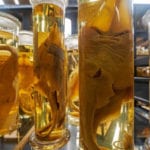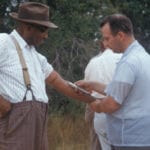 Weird Stuff
Weird Stuff  Weird Stuff
Weird Stuff  Mysteries
Mysteries 10 Tragic Disappearances and Deaths in Joshua Tree National Park
 History
History 10 Ways Childhood Really Sucked in the Old West
 Music
Music 10 Name Origins of Famous Bands from the 1990s
 Religion
Religion 10 Biggest Turnarounds by the Catholic Church
 Weird Stuff
Weird Stuff 10 Unbelievable Times Laws Had Unintended Consequences
 Humans
Humans Ten Historic Women Who Deserve Way More Credit Than They Got
 Movies and TV
Movies and TV 10 Films That Spawned Major Lawsuits
 History
History Ten Times Towns Were Wiped Off the Face of the Earth
 Creepy
Creepy 10 of the Most Disturbingly Haunted Public Houses in the UK
 Weird Stuff
Weird Stuff 10 Niche Subcultures That Are More Popular Than You Might Think
 Mysteries
Mysteries 10 Tragic Disappearances and Deaths in Joshua Tree National Park
 History
History 10 Ways Childhood Really Sucked in the Old West
Who's Behind Listverse?

Jamie Frater
Head Editor
Jamie founded Listverse due to an insatiable desire to share fascinating, obscure, and bizarre facts. He has been a guest speaker on numerous national radio and television stations and is a five time published author.
More About Us Music
Music 10 Name Origins of Famous Bands from the 1990s
 Religion
Religion 10 Biggest Turnarounds by the Catholic Church
 Weird Stuff
Weird Stuff 10 Unbelievable Times Laws Had Unintended Consequences
 Humans
Humans Ten Historic Women Who Deserve Way More Credit Than They Got
 Movies and TV
Movies and TV 10 Films That Spawned Major Lawsuits
 History
History Ten Times Towns Were Wiped Off the Face of the Earth
 Creepy
Creepy 10 of the Most Disturbingly Haunted Public Houses in the UK
Top 10 Evil Human Experiments
[WARNING] This list contains descriptions and images of human experimentation which may cause offense to some readers.] Human experimentation and research ethics evolved over time. On occasion, the subjects of human experimentation have been prisoners, slaves, or even family members. In some notable cases, doctors have performed experiments on themselves when they have been unwilling to risk the lives of others. This is known as self-experimentation. This is a list of the 10 most evil and unethical experiments carried out on humans.

The Stanford prison experiment was a psychological study of human responses to captivity and its behavioral effects on both authorities and inmates in prison. The experiment was conducted in 1971 by a team of researchers led by psychologist Philip Zimbardo at Stanford University. Undergraduate volunteers played the roles of both guards and prisoners living in a mock prison in the basement of the Stanford psychology building.
Prisoners and guards rapidly adapted to their roles, stepping beyond the boundaries of what had been predicted and leading to dangerous and psychologically damaging situations. One-third of the guards were judged to have exhibited “genuine” sadistic tendencies, while many prisoners were emotionally traumatized and two had to be removed from the experiment early. Finally, Zimbardo, alarmed at the increasingly abusive anti-social behavior from his subjects, terminated the entire experiment early.
Want more evil? Look no further than the horrifying accounts described in Doctors From Hell: The Horrific Account of Nazi Experiments on Humans at Amazon.com!

The Monster Study was a stuttering experiment on 22 orphan children in Davenport, Iowa, in 1939 conducted by Wendell Johnson at the University of Iowa. Johnson chose one of his graduate students, Mary Tudor, to conduct the experiment and he supervised her research. After placing the children in control and experimental groups, Tudor gave positive speech therapy to half of the children, praising the fluency of their speech, and negative speech therapy to the other half, belittling the children for every speech imperfection and telling them they were stutterers. Many of the normal speaking orphan children who received negative therapy in the experiment suffered negative psychological effects and some retained speech problems during the course of their life. Dubbed “The Monster Study” by some of Johnson’s peers who were horrified that he would experiment on orphan children to prove a theory, the experiment was kept hidden for fear Johnson’s reputation would be tarnished in the wake of human experiments conducted by the Nazis during World War II. The University of Iowa publicly apologized for the Monster Study in 2001.
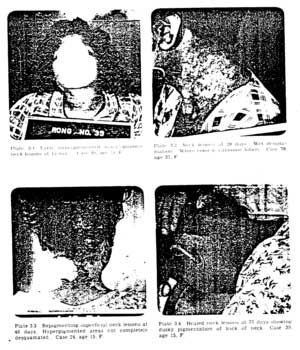
Project 4.1 was the designation for a medical study conducted by the United States of those residents of the Marshall Islands exposed to radioactive fallout from the March 1, 1954 Castle Bravo nuclear test at Bikini Atoll, which had an unexpectedly large yield. For the first decade after the test, the effects were ambiguous and statistically difficult to correlate to radiation exposure: miscarriages and stillbirths among exposed Rongelap women doubled in the first five years after the accident, but then returned to normal; some developmental difficulties and impaired growth appeared in children, but in no clear-cut pattern. In the decades that followed, though, the effects were undeniable. Children began to suffer disproportionately from thyroid cancer (due to exposure to radioiodines), and almost a third of those exposed developed neoplasms by 1974.
As a Department of Energy Committee writing on the human radiation experiments wrote, “It appears to have been almost immediately apparent to the AEC and the Joint Task Force running the Castle series that research on radiation effects could be done in conjunction with the medical treatment of the exposed populations.” The DOE report also concluded that “The dual purpose of what is now a DOE medical program has led to a view by the Marshallese that they were being used as ‘guinea pigs’ in a ‘radiation experiment.’”
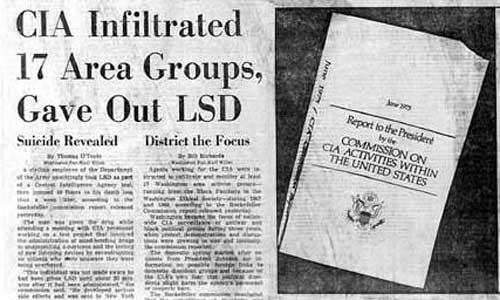
Project MKULTRA, or MK-ULTRA, was the code name for a CIA mind-control research program, run by the Office of Scientific Intelligence, that began in the early 1950s and continued at least through the late 1960s. There is much published evidence that the project involved the surreptitious use of many types of drugs, as well as other methodologies, to manipulate individual mental states and to alter brain function.
Experiments included administering LSD to CIA employees, military personnel, doctors, other government agents, prostitutes, mentally ill patients, and members of the general public in order to study their reactions. LSD and other drugs were usually administered without the subject’s knowledge and informed consent, a violation of the Nuremberg Code that the U.S. agreed to follow after WWII.
Efforts to “recruit” subjects were often illegal, even discounting the fact that drugs were being administered (though actual use of LSD, for example, was legal in the United States until October 6, 1966). In Operation Midnight Climax, the CIA set up several brothels to obtain a selection of men who would be too embarrassed to talk about the events. The men were dosed with LSD, and the brothels were equipped with one-way mirrors and the “sessions” were filmed for later viewing and study.
In 1973, CIA Director Richard Helms ordered all MKULTRA files destroyed. Pursuant to this order, most CIA documents regarding the project were destroyed, making a full investigation of MKULTRA virtually impossible.
Explore some of the most controversial human experiments ever conducted with The Search for the “Manchurian Candidate”: The CIA and Mind Control: The Secret History of the Behavioral Sciences at Amazon.com!

South Africa’s apartheid army forced white lesbian and gay soldiers to undergo ‘sex-change’ operations in the 1970’s and the 1980’s, and submitted many to chemical castration, electric shock, and other unethical medical experiments. Although the exact number is not known, former apartheid army surgeons estimate that as many as 900 forced ‘sexual reassignment’ operations may have been performed between 1971 and 1989 at military hospitals, as part of a top-secret program to root out homosexuality from the service.
Army psychiatrists aided by chaplains aggressively ferreted out suspected homosexuals from the armed forces, sending them discretely to military psychiatric units, chiefly ward 22 of 1 Military Hospital at Voortrekkerhoogte, near Pretoria. Those who could not be ‘cured’ with drugs, aversion shock therapy, hormone treatment, and other radical ‘psychiatric’ means were chemically castrated or given sex-change operations.
Although several cases of lesbian soldiers abused have been documented so far—including one botched sex-change operation—most of the victims appear to have been young, 16 to 24-year-old white males drafted into the apartheid army.
Dr. Aubrey Levin (the head of the study) is now Clinical Professor in the Department of Psychiatry (Forensic Division) at the University of Calgary’s Medical School. He is also in private practice, as a member in good standing of the College of Physicians and Surgeons of Alberta.
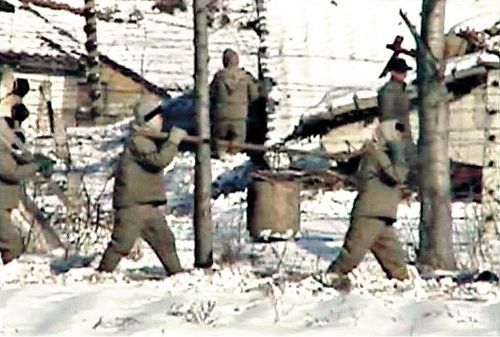
There have been many reports of North Korean human experimentation. These reports show human rights abuses similar to those of Nazi and Japanese human experimentation in World War II. These allegations of human rights abuses are denied by the North Korean government, who claim that all prisoners in North Korea are humanely treated.
One former North Korean woman prisoner tells how 50 healthy women prisoners were selected and given poisoned cabbage leaves, which all the women had to eat despite cries of distress from those who had already eaten. All 50 were dead after 20 minutes of vomiting blood and anal bleeding. Refusing to eat would have meant reprisals against them and their families.
Kwon Hyok, a former prison Head of Security at Camp 22, described laboratories equipped respectively for poison gas, suffocation gas and blood experiments, in which 3 or 4 people, normally a family, are the experimental subjects. After undergoing medical checks, the chambers are sealed and poison is injected through a tube, while “scientists” observe from above through glass. Kwon Hyok claims to have watched one family of 2 parents, a son and a daughter die from suffocating gas, with the parents trying to save the children using mouth-to-mouth resuscitation for as long as they had the strength.
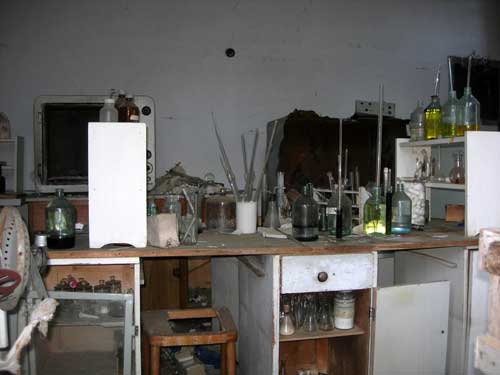
The Poison laboratory of the Soviet secret services, also known as Laboratory 1, Laboratory 12 and “The Chamber”, was a covert poison research and development facility of the Soviet secret police agencies. The Soviets tested a number of deadly poisons on prisoners from the Gulag (“enemies of the people”), including mustard gas, ricin, digitoxin and many others. The goal of the experiments was to find a tasteless, odorless chemical that could not be detected post mortem. Candidate poisons were given to the victims, with a meal or drink, as “medication”.
Finally, a preparation with the desired properties called C-2 was developed. According to witness testimonies, the victim changed physically, became shorter, weakened quickly, became calm and silent and died within fifteen minutes. Mairanovsky brought to the laboratory people of varied physical condition and ages in order to have a more complete picture about the action of each poison.
In addition to human experimentation, Mairanovsky personally executed people with poisons, under the supervision of Pavel Sudoplatov.
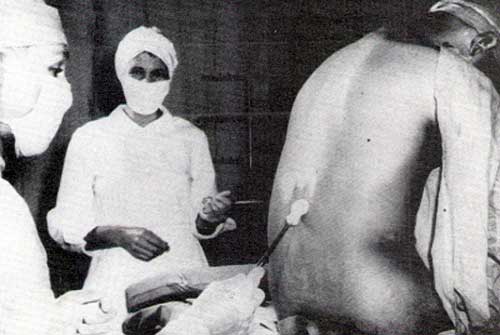
The Tuskegee Study of Untreated Syphilis in the Negro Male was a clinical study, conducted between 1932 and 1972 in Tuskegee, Alabama, in which 399 (plus 201 control group without syphilis) poor — and mostly illiterate — African American sharecroppers were denied treatment for Syphilis.
This study became notorious because it was conducted without due care to its subjects, and led to major changes in how patients are protected in clinical studies. Individuals enrolled in the Tuskegee Syphilis Study did not give informed consent and were not informed of their diagnosis; instead they were told they had “bad blood” and could receive free medical treatment, rides to the clinic, meals and burial insurance in case of death in return for participating. In 1932, when the study started, standard treatments for syphilis were toxic, dangerous, and of questionable effectiveness. Part of the original goal of the study was to determine if patients were better off not being treated with these toxic remedies. For many participants, treatment was intentionally denied. Many patients were lied to and given placebo treatments—in order to observe the fatal progression of the disease.
By the end of the study, only 74 of the test subjects were still alive. Twenty-eight of the men had died directly of syphilis, 100 were dead of related complications, 40 of their wives had been infected, and 19 of their children had been born with congenital syphilis.
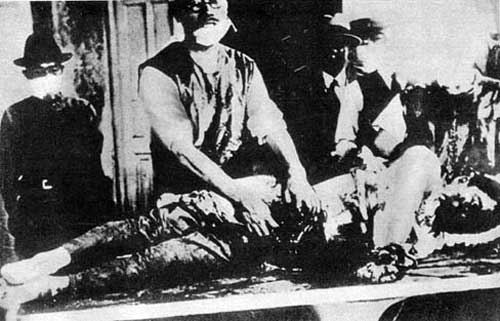
Unit 731 was a covert biological and chemical warfare research and development unit of the Imperial Japanese Army that undertook lethal human experimentation during the Second Sino-Japanese War (1937–1945) and World War II. It was responsible for some of the most notorious war crimes carried out by Japanese personnel.
Some of the numerous atrocities committed by the commander Shiro Ishii and others under his command in Unit 731 include: vivisection of living people (including pregnant women who were impregnated by the doctors), prisoners had limbs amputated and reattached to other parts of their body, some prisoners had parts of their bodies frozen and thawed to study the resulting untreated gangrene. Humans were also used as living test cases for grenades and flame throwers. Prisoners were injected with strains of diseases, disguised as vaccinations, to study their effects. To study the effects of untreated venereal diseases, male and female prisoners were deliberately infected with syphilis and gonorrhea via rape, then studied. A complete list of these horrors can be found here.
Having been granted immunity by the American Occupation Authorities at the end of the war, Ishii never spent any time in jail for his crimes and died at the age of 67 of throat cancer.
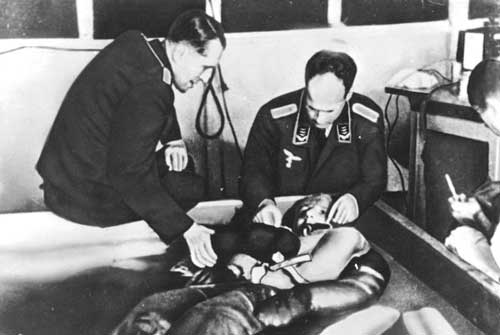
Nazi human experimentation was medical experimentation on large numbers of people by the German Nazi regime in its concentration camps during World War II. At Auschwitz, under the direction of Dr. Eduard Wirths, selected inmates were subjected to various experiments which were supposedly designed to help German military personnel in combat situations, to aid in the recovery of military personnel that had been injured, and to advance the racial ideology backed by the Third Reich.
Experiments on twin children in concentration camps were created to show the similarities and differences in the genetics and eugenics of twins, as well as to see if the human body can be unnaturally manipulated. The central leader of the experiments was Dr. Josef Mengele, who performed experiments on over 1,500 sets of imprisoned twins, of which fewer than 200 individuals survived the studies. Dr. Mengele organized the testing of genetics in twins. The twins were arranged by age and sex and kept in barracks in between the test, which ranged from the injection of different chemicals into the eyes of the twins to see if it would change their colors to literally sewing the twins together in hopes of creating conjoined twins.
In 1942 the Luftwaffe conducted experiments to learn how to treat hypothermia. One study forced subjects to endure a tank of ice water for up to three hours (see image above). Another study placed prisoners naked in the open for several hours with temperatures below freezing. The experimenters assessed different ways of rewarming survivors.
From about July 1942 to about September 1943, experiments to investigate the effectiveness of sulfonamide, a synthetic antimicrobial agent, were conducted at Ravensbrück. Wounds inflicted on the subjects were infected with bacteria such as Streptococcus, gas gangrene, and tetanus. Circulation of blood was interrupted by tying off blood vessels at both ends of the wound to create a condition similar to that of a battlefield wound. Infection was aggravated by forcing wood shavings and ground glass into the wounds. The infection was treated with sulfonamide and other drugs to determine their effectiveness.
This article is licensed under the GFDL because it contains text from Wikipedia.



